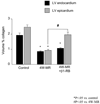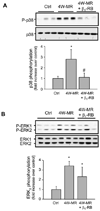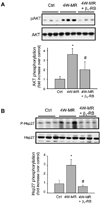Sympathetic activation causes focal adhesion signaling alteration in early compensated volume overload attributable to isolated mitral regurgitation in the dog
- PMID: 18356543
- PMCID: PMC3092391
- DOI: 10.1161/CIRCRESAHA.107.163642
Sympathetic activation causes focal adhesion signaling alteration in early compensated volume overload attributable to isolated mitral regurgitation in the dog
Expression of concern in
-
Expression of Concern: Sympathetic Activation Causes Focal Adhesion Signaling Alteration in Early Compensated Volume Overload Attributable to Isolated Mitral Regurgitation in the Dog.Circ Res. 2023 Mar 31;132(7):e114. doi: 10.1161/RES.0000000000000604. Epub 2023 Mar 13. Circ Res. 2023. PMID: 36912159 No abstract available.
Abstract
We reported that left ventricular (LV) dilatation after 4 weeks of isolated mitral regurgitation (MR) in the dogs is marked by extracellular matrix loss and an increase in adrenergic drive. Given that extracellular matrix proteins and their receptor integrins influence beta-adrenergic receptor (beta-AR) responses in vitro, we tested whether beta1-AR activation modulates focal adhesion (FA) signaling and LV remodeling in these same dogs with isolated MR. Normal dogs were compared with dogs with MR of a 4-week duration and with MR dogs treated with beta(1)-AR blockade (beta(1)-RB) (extended-release metoprolol succinate, 100 mg QD) that was started 24 hours after MR induction. In MR LVs, a decrease in collagen accumulation compared with normal dogs was associated with a decrease in FA kinase tyrosine phosphorylation, along with FA kinase interaction with adapter and cytoskeletal proteins, p130(Cas) and paxillin, respectively, as determined by immunoprecipitation assays. There was increased phosphorylation of stress related molecules p38 mitogen-activated protein kinase (MAPK) and Hsp27 and survival signaling kinases extracellular signal-regulated kinase 1/2 and AKT, with no evidence of cardiomyocyte apoptosis. beta(1)-RB attenuated FA signaling loss and prevented p38 MAPK, Hsp27, and AKT phosphorylation induced by MR and significantly increased LV epicardial collagen content. However, beta(1)-RB did not improve LV endocardial collagen loss or LV dilatation induced by MR. Isolated myocytes from normal and MR dog hearts treated with beta(1)- or beta(2)-AR agonists demonstrated no difference in FA kinase, p38 MAPK, Hsp27, or AKT phosphorylation. These results showed that chronic stimulation of beta(1)-AR during early compensated MR impairs FA signaling that may affect myocyte/fibroblast-extracellular matrix scaffolding necessary for LV remodeling.
Figures











References
-
- Tallaj J, Wei C-C, Hankes GH, Holland M, Rynders P, Dillon AR, Ardell JL, Armour JA, Lucchesi PA, Dell'Italia LJ. {beta}1-adrenergic receptor blockade attenuates angiotensin II-mediated catecholamine release into the cardiac interstitium in mitral regurgitation. Circulation. 2003;108:225–230. - PubMed
-
- Stewart J, James A, Wei C-C, Brower GL, Rynders PE, Hankes GH, Dillon AR, Lucchesi PA, Janicki JS, Dell'Italia LJ. Cardiac mast cell- and chymase-mediated matrix metalloproteinase activity and left ventricular remodeling in mitral regurgitation in the dog. J Mol Cell Cardiol. 2003;35:311–319. - PubMed
-
- Dell'italia LJ, Balcells E, Meng QC, Su X, Schultz D, Bishop SP, Machida N, Straeter-Knowlen IM, Hankes GH, Dillon R, Cartee RE, Oparil S. Volume-overload cardiac hypertrophy is unaffected by ACE inhibitor treatment in dogs. Am J Physiol Heart Circ Physiol. 1997;273:H961–H970. - PubMed
-
- Perry GJ, Wei C-C, Hankes GH, Dillon SR, Rynders P, Mukherjee R, Spinale FG, Dell'Italia LJ. Angiotensin II receptor blockade does not improve left ventricular function and remodeling in subacute mitral regurgitation in the dog. J Am Coll Cardiol. 2002;39:1374–1379. - PubMed
Publication types
MeSH terms
Substances
Grants and funding
LinkOut - more resources
Full Text Sources
Research Materials
Miscellaneous

